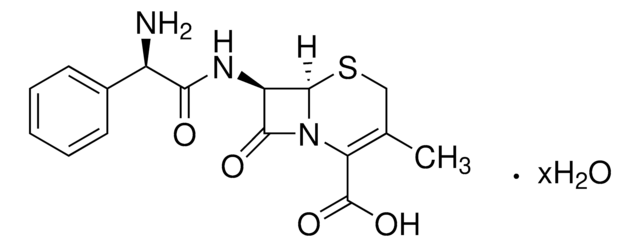C6895
Cefaclor
Synonym(s):
7-(D-2-Amino-2-phenylacetamido)-3-chloro-3-cephem-4-carboxylic acid
About This Item
Recommended Products
form
powder or crystals
solubility
soluble (slightly soluble in water, practically insoluble in methanol, ethanol)
antibiotic activity spectrum
Gram-negative bacteria
Gram-positive bacteria
Mode of action
cell wall synthesis | interferes
SMILES string
N[C@@H](C(=O)N[C@H]1[C@H]2SCC(Cl)=C(N2C1=O)C(O)=O)c3ccccc3
InChI
1S/C15H14ClN3O4S/c16-8-6-24-14-10(13(21)19(14)11(8)15(22)23)18-12(20)9(17)7-4-2-1-3-5-7/h1-5,9-10,14H,6,17H2,(H,18,20)(H,22,23)/t9-,10-,14-/m1/s1
InChI key
QYIYFLOTGYLRGG-GPCCPHFNSA-N
Looking for similar products? Visit Product Comparison Guide
General description
Application
Biochem/physiol Actions
Other Notes
Storage Class Code
11 - Combustible Solids
WGK
WGK 2
Flash Point(F)
Not applicable
Flash Point(C)
Not applicable
Personal Protective Equipment
Certificates of Analysis (COA)
Search for Certificates of Analysis (COA) by entering the products Lot/Batch Number. Lot and Batch Numbers can be found on a product’s label following the words ‘Lot’ or ‘Batch’.
Already Own This Product?
Find documentation for the products that you have recently purchased in the Document Library.
Customers Also Viewed
Our team of scientists has experience in all areas of research including Life Science, Material Science, Chemical Synthesis, Chromatography, Analytical and many others.
Contact Technical Service












